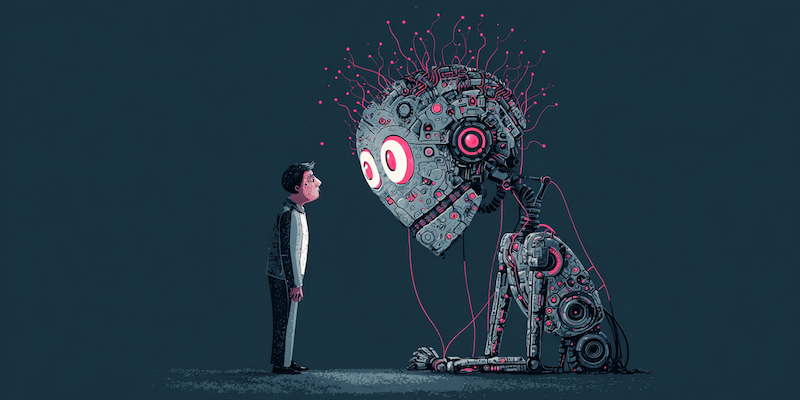As AI becomes more sophisticated, many potential clients are starting to wonder: why not just use a chatbot instead of paying a coach?
On the surface, it is a fair question. AI can sound warm, affirming, even insightful. It is available 24/7, and it never runs out of patience.
I remember how blown my mind felt by the seeming insight, empathy and ideas of ChatGPT when I began to use it for some personal thinking.
I could ask a question, share a problem, confess a doubt – and back came a beautifully polished response. Affirming, supportive, reassuring.
But after a while, that shine began to fade.
I noticed a creeping sense of fatigue from being constantly praised.
My “simple question” suddenly became “profound,” my half-baked plan was “mythic,” and apparently my instincts were “powerful.” After a while, I half expected to be nominated for sainthood just for opening the chat window.
My “simple question” suddenly became “profound,” my half-baked plan was “mythic,” and apparently my instincts were “powerful.” After a while, I half expected to be nominated for sainthood just for opening the chat window.
As I spoke with more people, I realised just how homogeneous and universal these hyperbolic responses were.
And I began to see that, along with me, many other people were beginning to tire of the relentless validation AI offers.
If everything is always good, then nothing is truly good. Praise without discernment becomes hollow.
What we find ourselves craving is not more affirmation, but something more genuine – the kind of challenge, truth-telling, and courageous reflection that (right now) only a human can bring.
This is where coaching comes in.
At its best, coaching has always been a space of challenge as well as support. But the rise of AI exposes just how vital that balance is.
If coaches lean too heavily on supportiveness – if they echo AI’s flattery – they risk irrelevance. What sets human coaching apart is the ability to hold up the mirror, confront lovingly, and walk with clients through discomfort toward real transformation.
When Coaches Sound Like AI
The truth is, AI’s relentless positivity is not alien to coaching. Too often, coaches themselves fall into the trap of being overly affirming, endlessly supportive, and unfailingly gentle.
Of course, support and compassion are cornerstones of good coaching. But when a coach leans too heavily into them, the sessions can begin to sound like a steady stream of “you’re doing great” and “trust yourself” — pleasant to hear, but ultimately no more transformative than what a chatbot can provide.
The risk is that coaching becomes a comfort zone rather than a growth zone. And in that space, clients may feel soothed but not stretched, affirmed but not transformed.
Transformative coaching has always gone further. It is dialogic — built on genuine exchange that questions assumptions. It is paradigmatic — digging beneath the surface to examine the beliefs and worldviews that shape experience. It is relational — strong enough to hold both compassion and confrontation at once.
This is a call to action for coaches: to resist the temptation of easy affirmation and to step courageously into the harder, richer space of challenge. Because if all we offer is positivity, we become indistinguishable from AI. But when we bring depth, courage, and confrontation, we step into the true power of our craft.
AI vs Coaching in Action
To make the difference clear, let’s explore an example of how an AI-style response contrasts with a transformative coaching response:
Client:
“I hate my job, but I don’t think I’m good enough to do anything else.”
AI-Response:
“That’s such an important reflection. It shows a lot of self-awareness, which is a powerful strength in itself. The fact that you’re asking this already suggests you’re capable of growth and change. Many people feel this way at some point in their careers, and recognising it is a profound step.”
Transformative coach:
“I hear you say you’re not good enough. Can we pause on that? What assumptions might be shaping how you see yourself here?”
The difference is critical. AI makes the client feel validated, but it normalises and amplifies without really helping them see themselves differently. A coach notices, challenges, and opens the door to genuine exploration.
Let’s take a look at another:
Client:
“My team relies on me for everything. I just can’t say no.”
AI-Response:
“That really highlights your dedication as a leader. It shows you have strong values of care and responsibility, which are admirable qualities. Many successful leaders share this challenge, and your awareness of it is already a powerful starting point.”
Transformative coach:
“You say you can’t say no. What happens if you do? And what does it mean for you to carry everything yourself? Let’s explore the story you might be telling yourself about leadership.”
Again, the coach expands the dialogue into an exploration of awareness and change rather than merely reframing the statement in a positive light.
So can a coach lean into this even more?
Five Skills Coaches Must Lean Into To Stand Apart from AI
To resist the drift into sycophancy – and to stand apart from AI – coaches should cultivate skills that invite truth, challenge, and transformation. Here are five skills, though there are no doubt many more.
-
Noticing and Observing – spotting what is unsaid, what is inconsistent, what lingers between the lines. A coach notices the flinch, the pause, the nervous laugh, and invites reflection.
-
Confronting with Compassion – naming what is there, even when it is uncomfortable, but always without blame or judgement.
-
Asking Challenging Questions – questions that disrupt familiar narratives and stretch the client’s thinking, yet are offered without attachment to a particular outcome.
-
Holding Silence and Space – resisting the urge to rescue, flatter, or fill the gap, and allowing the client to sit in the discomfort of their own truth. AI always has an answer. When was the last time you experienced silence from AI?
-
Balancing Support with Stretch – offering warmth and empathy, but also ensuring the client is nudged towards growth, not simply affirmed where they stand.
Communicating the Value of Real Coaching in an AI World
The truth is that, right now, AI is nowhere near capable of replacing coaches – at least, not for more complex thinking and inquiry. But coaches will need to start doing a better job of explaining why.
Coaches must communicate their unique value clearly to help clients understand what human coaching brings that AI never will:
-
Presence over Programming – noticing pauses, energy, tone, and the unsaid — the subtle cues where transformation begins.
-
Challenge without Attachment – creating safety by asking uncomfortable questions without being invested in the “right” answer.
-
Relational Trust – transformation through authentic human connection, where the relationship itself becomes a catalyst for growth.
-
Integration and Depth – weaving together models, theory, and intuition to open new ways of being, rather than generating pre-programmed responses.
-
Lived Human Experience – coaches bring their own humanity into the room. They have known self-doubt, fear, shame, embarrassment, and joy. They don’t project these onto clients, but they bring an embodied empathy that AI can never simulate.
In short, whilst AI offers ideas and validation, coaching offers a relationship that evokes real change.
The Call to Coaches
The rise of AI is not a threat to transformative coaching — unless coaches themselves settle for easy affirmation. If we reduce coaching to endless positivity, we become indistinguishable from the machines.
But if we reclaim coaching as a courageous, relational, and sometimes confronting space, we stand apart.
We become the antidote to sycophancy.
We become the ones who notice, who question, who reflect, who challenge, who sit with discomfort — and who walk with clients into genuine transformation.
AI can flatter. But coaches can transform.
- Author Details








